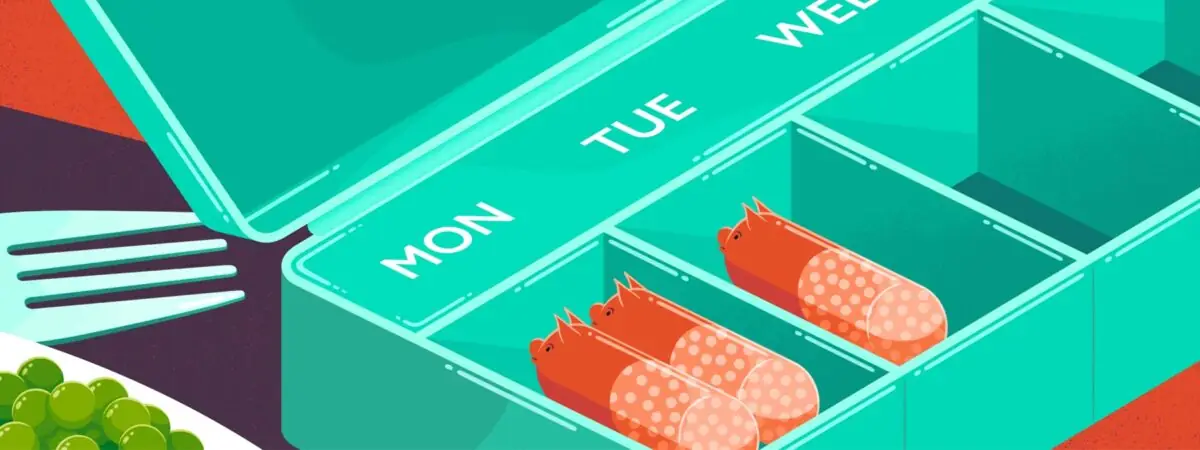“I was down to my last five days’ supply when I posted on social media. I looked into buying some, and could only find the Creon 10,000 capsules, which would mean taking up to 30 capsules per meal,” says Bryony Thomas, who is based in Gloucestershire and was prescribed Creon — a pancreatic enzyme replacement therapy (PERT) — following her pancreatic cancer diagnosis in December 2019.
“I found one supplier of Creon 25,000 in Israel, where a month’s supply would have cost me £2,000. Then a fellow patient offered to send me some leftover supply they had. I know sharing supplies is against the law, but I had no other option.”
PERT helps with digestion by replacing enzymes produced in the pancreas, with those sourced from pigs. It is used by people who have conditions that prevent their pancreas from producing enough enzymes to digest food properly — also known as pancreatic exocrine insufficiency (PEI) — commonly observed in pancreatitis, pancreatic cancer and cystic fibrosis (CF), as well as people who have had their pancreas removed1 (see Box 1).
Box 1: Types of PERT in the UK
Pancreatic enzyme replacement therapy (PERT) contains three main enzymes to help digestion of different nutrients — lipase for fat, protease for protein and amylase for starch (carbohydrate)3. PERT is essential for the absorption of fats, oils and fat-soluble vitamins and also improves the absorption of some medicines, such as Kaftrio (elexacaftor/tezacaftor/ivacaftor; Vertex) for the treatment of cystic fibrosis4.
In the UK, there are three PERT brands — Creon, which is the market leader; Nutrizym 22; and Pancrex V, a low-strength preparation4,5 — all of which are available in capsules that contain small beads of enzymes with enteric coating to protect them from stomach acid3.
Pancrex V is also available in powder form, which can be administered orally and via nasogastric or gastrostomy tube6.
Pancrease HL capsules were discontinued by Janssen-Cilag in November 20237.
Supply disruptions for all three PERT products available in the UK — Creon (Viatris), Nutrizym 22 (Zentiva), and Pancrex V (Essential Pharma) — were announced on 9 May 2024 in a national patient safety alert (NPSA) published by the Department of Health and Social Care (DHSC)2.
The NPSA confirmed that there would be limited supplies of Creon capsules until 2026, no stocks of Nutrizym 22 capsules until August 2024, and insufficient supplies of Pancrex V to support the subsequent increase in demand.
I know sharing supplies is against the law, but I had no other option
Bryony Thomas, prescribed Creon after being diagnosed with pancreatic cancer
These shortages have had a significant impact on patients’ quality of life, with many patients going hungry or having to tolerate digestive symptoms, such as diarrhoea and bloating, because they are having to ration their dose. In Thomas’s case, she had to resort to breaking the law to secure a supply.
To address the shortage, the government told The Pharmaceutical Journal on 28 October 2024 that it was “working closely with industry, the NHS, manufacturers and other partners in the supply chain to resolve current issues as quickly as possible”.
However, with supply issues expected to continue until 2026, it is unclear when the shortage will begin to ease.
As patients eagerly await developments, organisations are working to minimise the impact.
Increasing demand
Since the early 1990s, the demand for PERT has been rising steadily. According to charity Pancreatic Cancer UK, the incidence rate of pancreatic cancer in the UK increased by 8% between 2007–2009 and 2017–2019, with over 10,000 new cases reported on average each year between 2017 and 20198,9. During this time, mortality rates have increased by less than 3%8.
There has also been an increase in the number of people with CF in the UK, from 10,509 people reported on the national register in 2018 to 11,318 people in 2023, with a decline in annual mortality from 137 people to 49 people during this time (see Figure 1)10.
CF is a genetic condition resulting from a faulty gene that affects the movement of salt and water in and out of cells, causing the body to produce thick, sticky mucus11. This can block the release of pancreatic enzymes and also lead to inflammation of the pancreas12. It is estimated that 80–90% of cystic fibrosis patients require PERT13.
The growing number of patients requiring PERT has meant that more people have been impacted by its shortage. A letter sent to health secretary Wes Streeting in July 2024 from Pancreatic Cancer UK and other patient organisations estimates the total number affected to be more than 60,000 people across the UK.
Patient impact
“The longest [period I went without PERT] was probably three-and-a-half days. During this time, I’d eat because I had to eat, and I’d suffer. I’d get stomach pains, diarrhoea — it wasn’t great,” says Jonathon from Lancashire, who was diagnosed with CF at birth and has been taking Creon for most of his life.
“I’ve had access to Creon for a long time now, but I started not being able to fill the orders [fully] around February/March [2024]… then this became ‘we can’t do it’ from local pharmacies.
“I had to go to hospital, which was an hour away from me, to get the medication — a two-hour round trip just to eat. I was skipping meals, which is not good for anyone, but it’s particularly bad because with Kaftrio, you have to eat fat in order for it to get fully absorbed,” he explains.
Kaftrio, manufactured by Vertex Pharmaceuticals, belongs to a class of medicines called the CF transmembrane conductance regulator (CFTR) modulators14. It improves lung function in people with CF and must be taken with fatty foods and PERT to ensure absorption14,15. Without Creon, the effectiveness of the modulator is diminished, which Jonathon says has reduced his lung function.
It’s ridiculous, you don’t even know where to go. Ringing around pharmacies, rationing supplies… it’s just this ongoing struggle
Jonathon, who has cystic fibrosis
“It’s ridiculous, you don’t even know where to go [for supply]. Ringing around pharmacies, rationing supplies… it’s just this ongoing struggle,” says Jonathon.
Survey results published by the Cystic Fibrosis Trust on 12 November 2024 revealed that one in five people with CF reported losing weight owing to a lack of supply of PERT, with 37% of 747 respondents forced to adjust their diet in the past month and 8% reporting that they had completely run out of supply16.
The results also revealed that one in five (21%) respondents said they have spent four or more hours per week trying to find and collect supplies, resulting in increased travel costs.
Over one-third (40%) of respondents also reported that the shortage has had a severe impact on their health and wellbeing, with 80% of these respondents saying it made them feel stressed and anxious.
Thomas said the impact of the shortages have forced her to take a backward step in her career as a conference speaker.
“One of the reasons for that is my fear of being on stage during a 40-minute talk and needing to go to the toilet,” she says.
“I take massive amounts of Creon, up to 9 capsules of the 25,000 units with each meal. Throughout the day, I can easily take 40 capsules, which means I’ll go through a tub of 100 [capsules] in 3 days.
“Now, every time I go to take a capsule, I’m thinking, do I really need as much of that? Can I just take a bit less? And every time I open the cupboard to get a new pot out, I’m counting down my pots.”
Organisation response
To minimise the impact of the shortage, two joint position statements were published in July 2024, signed by organisations including the British Society of Gastroenterology (pancreas section), the Pancreatic Society of Great Britain and Ireland, Pancreatic Cancer UK, GUTS UK, the Cystic Fibrosis Trust, CF Medical Association, Pancreatic Cancer Action, Neuroendocrine Cancer UK and the British Dietetic Association17.
The first document included clinical management suggestions for prescribers, such as prioritising certain patient groups (e.g. CF and people with pancreatic cancer), prescribing a range of pancreatic enzymes and prescribing alternative medicines to help improve digestive symptoms18.
The other position statement advised patients not to “stockpile” medicines and to apply for pre-payment certificates to reduce the cost of prescription charges while only one month’s supply is issued during the shortage, as well as advise affected patients on how to ration their supply, including examples of meal plans19.
It’s frustrating for us because we can’t do anything quickly to help people get supplies
Anna Jewell, director of support, research and influencing at Pancreatic Cancer UK
“We’ve been trying to make sure that there is clear information on how people affected by the shortage can manage and what they can do to try get hold of medication,” says Anna Jewell, director of support, research and influencing at Pancreatic Cancer UK.
“We have a support line staffed by specialist nurses to provide support to people affected and have been in regular conversations with the DHSC on this issue but haven’t had an agreement yet for the national action plan.
“We definitely can see that there are supply issues in Europe. It doesn’t seem to be a problem at the same level in the United States or Australia, and that’s why we are pushing for the government to look at how we can import from other parts of the world that we haven’t traditionally done,” she adds.
“It’s frustrating for us, as an organisation, because, other than advising people on different tactics to navigate the system locally, right now, we can’t do anything quickly to help people get supplies.”
Government response
On 12 September 2024, the DHSC responded to the joint letter from Pancreatic Cancer UK and other patient organisations denying their request for an urgent meeting to discuss “key policy solutions” to address the problem (see Box 220).
Box 2: Five-point plan for pancreatic enzyme replacement therapy shortage
After consulting with patients, suppliers, charities and healthcare professionals, Pancreatic Cancer UK suggested a five-point plan to address pancreatic enzyme replacement therapy (PERT) shortages, calling on the UK government to:
- Urgently deliver a national action plan;
- Meet demand for PERT now, including through national effort to import PERT;
- Get on top of supply and demand issues;
- Provide clear information to patients and healthcare professionals;
- Find a long-term solution to resolve PERT production issues20.
In the government’s response, health minister Karin Smyth said: “We are working closely with all suppliers of PERT to mitigate the supply issue in the short and long-term.” She said this included asking suppliers to speed up deliveries, source stock from other markets and increase production.
In October 2024, the issue was raised in the House of Commons by Conservative MP Andrew Mitchell, who asked what steps the government is taking to tackle the Creon shortage21. In her reply, Smyth referred to serious shortage protocols in place for Creon, which pharmacists can use to restrict supply to one month at a time to ensure more patients have access to it while stock is limited22.
Smyth also said the government has worked closely with colleagues in NHS England to issue comprehensive guidance to healthcare professionals.
“The guidance provides advice on how to manage patients whilst there is disruption to supply and is being kept under review, with updates made as necessary,” she added.
Pharmacists are witnessing the toll that these shortages have on patients and their families
James Davies, director for England at the Royal Pharmaceutical Society
James Davies, director for England at the Royal Pharmaceutical Society (RPS), says while the RPS supports the DHSC in working with suppliers to alleviate these shortages, more must be done to strengthen the supply chain.
“We want to see regional hubs set up for critical medicines, such as PERT, so patients don’t have to travel so far to get access to the treatment they need,” he says.
“Pharmacists are witnessing the toll that these shortages have on patients and their families, as well as healthcare teams.
“Delays in receiving medicines mean pharmacists spend hours tracking down supplies when their time and expertise could be spent advising and treating more patients,” adds Davies.
Production
The production of PERT relies predominantly on pancreatic enzymes sourced from pigs owing to them being the closest in function to human pancreatic enzymes1,23.
Since the 1990s, there has been a change in the way the pork industry raises and processes pigs to meet consumers’ demand for leaner cuts of meat24. This global push for leaner pigs has resulted in fewer available enzymes, making it harder for manufacturers to maintain production to meet the increasing demand for PERT23.
On 24 October 2024, a spokesperson for Viatris, the UK distributor of Creon, told The Pharmaceutical Journal that “constrained supply is due to high global demand and reaching maximum manufacturing supply output”.
While its manufacturing partner Abbott is currently unable to meet all demand, Viatris added that its “plans to reduce [supply] constraints and increase capacity are underway” and it hopes to be “able to supply approximately 90–95% of the average monthly demand for Creon lipase units into the [UK] market”.
Despite these efforts, the uplift in production is not expected to have an impact until 202623.
Consequently, the global shortage of Creon — along with the discontinuation of Pancreas HL by Janssen-Cilag in November 2023 “for commercial reasons” — has had a significant knock-on effect on the remaining brands of PERT in the UK25,26.
Zentiva, manufacturer of Nutrizym 22, told The Pharmaceutical Journal on 31 October 2024 that, while plans are in place to increase manufacturing, “due to the significant market share of Creon products, intermittent shortages [of Nutrizym 22] may continue until Creon resolve their supply issues”.
Ingvild Liborg, vice president of integration at Essential Pharma, manufacturer of Pancrex V, says there has been a big uptick in demand for its product since the supply disruptions with Creon. “We normally serve a very small portion of the market. We now have to serve a larger portion.
“Our current active pharmaceutical ingredient (API) manufacturers can’t give us more [enzymes] this year. What we’ve been told is that they are struggling with getting enough pigs or enough pancreas from pigs that has the right quality to be used, to then harvest enzymes from it,” she explains.
“We’ve been out on the market trying to get a new API source … that has also been very difficult.”
Quality of life
Ben Kind, head of policy and public affairs at the Cystic Fibrosis Trust, says the fundamental problem stems from Viatris having a large share of the market for this essential medicine, with no synthetic alternatives available.
“We pushed for a while for people to be able to find a way to get information about where stock was being distributed in the country. As a result, Viatris have set up a helpline,” says Kind.
If Viatris cannot ensure that there is a stable supply, it’s the responsibility of the health service to do something
Ben Kind, head of policy and public affairs at the Cystic Fibrosis Trust
“It doesn’t give you real-time information but gives you a guide to know where there has been a delivery in the area.”
Kind emphasises the urgent need for government intervention.
“There are serious levels of anxiety and stress on people to go around hunting for new supplies. Then the added pressure that puts on individuals to take time off work, or if they’re in education, to come out of education.
“All of that, let alone the physical side effects of not having the medicines, it’s not good enough just to say, hang on for 18 months, maybe two years,” he adds.
“That’s why, ultimately, the DHSC really does need to intervene. If Viatris cannot ensure that there is a stable supply, it’s the responsibility of the health service to do [something].”
In the meantime, patients are left struggling to maintain their quality of life.
“As I stand today, I have about a fortnight’s supply. It’s a constant stress,” says Thomas.
“I’ve been reading up on how long a person can survive without fat and protein and limiting my intake to make my stocks last longer.
“Living without PERT isn’t just about nutrition. It’s quality of life.”
- 1.GUTS UK. Pancreatic Exocrine Insufficiency (PEI) and Pancreatic Enzyme Replacement Therapy (PERT). GUTS UK. June 7, 2023. Accessed November 15, 2024. https://gutscharity.org.uk/advice-and-information/conditions/pancreatic-exocrine-insufficiency-pei-and-pancreatic-enzyme-replacement-therapy-pert/
- 2.Department of Health and Social Care. Shortage of Pancreatic enzyme replacement therapy (PERT). National Patient Safety Alert – DHSC. May 24, 2024. Accessed November 15, 2024. https://www.cas.mhra.gov.uk/ViewandAcknowledgment/ViewAlert.aspx?AlertID=103253
- 3.Cambridge University Hospitals NHS Foundation Trust. Pancreatic enzyme replacement therapy (PERT) for pancreatic insufficiency. Cambridge University Hospitals NHS Foundation Trust. April 26, 2023. Accessed November 15, 2024. https://www.cuh.nhs.uk/patient-information/information-for-people-taking-pancreatic-enzymes-for-pancreatic-insufficiency/#:~:text=The%20beads%20contain%20three%20main%20enzymes%20which,to%20digest%20starch%20(a%20type%20of%20carbohydrate)
- 4.Cystic Fibrosis Trust. Our work on Creon shortages. Cystic Fibrosis Trust. June 13, 2024. Accessed November 15, 2024. https://www.cysticfibrosis.org.uk/news/our-work-on-creon-shortages
- 5.Pancreatic Cancer UK. Pancreatic enzyme replacement therapy (PERT). Pancreatic Cancer UK. March 2023. Accessed November 15, 2024. https://www.pancreaticcancer.org.uk/information/managing-symptoms-and-side-effects/diet-and-pancreatic-cancer/pancreatic-enzyme-replacement-therapy-pert/
- 6.Essential Pharmaceuticals Ltd. Pancrex V Powder, Summary of product characteristics. electronic medicines compendium. July 3, 2024. Accessed November 15, 2024. https://www.medicines.org.uk/emc/product/1056/smpc
- 7.Community Pharmacy England. Medicine Supply Notification: Pancrease® HL gastro-resistant capsules. Community Pharmacy England. October 12, 2023. Accessed November 15, 2024. https://cpe.org.uk/our-news/medicine-supply-notification-pancrease-hl-gastro-resistant-capsules/
- 8.Cancer Research UK. Pancreatic cancer statistics. Cancer Research UK. Accessed November 15, 2024. https://www.cancerresearchuk.org/health-professional/cancer-statistics/statistics-by-cancer-type/pancreatic-cancer#heading-One
- 9.Cancer Research UK. Pancreatic cancer incidence statistics. Cancer Research UK. Accessed November 15, 2024. https://www.cancerresearchuk.org/health-professional/cancer-statistics/statistics-by-cancer-type/pancreatic-cancer/incidence#heading-Two
- 10.Cystic Fibrosis Trust. UK Cystic Fibrosis Registry 2023 Annual Data Report. Cystic Fibrosis Trust. October 2024. Accessed November 15, 2024. https://www.cysticfibrosis.org.uk/sites/default/files/2024-11/CFT_2023_Annual_Data_Report_Oct2024 1.pdf
- 11.NHS England. Overview – Cystic fibrosis. NHS England. March 16, 2021. Accessed November 15, 2024. https://www.nhs.uk/conditions/cystic-fibrosis/
- 12.Cystic Fibrosis Trust. Digestive system and cystic fibrosis. Cystic Fibrosis Trust. Accessed November 15, 2024. https://www.cysticfibrosis.org.uk/what-is-cystic-fibrosis/how-does-cystic-fibrosis-affect-the-body/cystic-fibrosis-complications/digestive-system#:~:text=The%20pancreas%20creates%20enzymes%2C%20which,of%20people%20with%20cystic%20fibrosis.&text=Because%20of%20these%20difficulties%20digesting,loss%20of%20appetite
- 13.Somaraju URR, Solis-Moya A. Pancreatic enzyme replacement therapy for people with cystic fibrosis. Cochrane Database of Systematic Reviews. 2020;2020(9). doi:10.1002/14651858.cd008227.pub4
- 14.Cystic Fibrosis Trust. Life-saving drugs FAQs. Cystic Fibrosis Trust. Accessed November 15, 2024. https://www.cysticfibrosis.org.uk/the-work-we-do/campaigning-hard/life-saving-drugs/life-saving-drugs-faqs
- 15.Leeds Teaching Hospitals NHS Trust. Modulator therapy food guide – Information for patients & carers. Leeds Teaching Hospitals NHS Trust. December 2023. Accessed November 15, 2024. https://flipbooks.leedsth.nhs.uk/LN004739.pdf
- 16.Cystic Fibrosis Trust. We’re calling on the Government to address Creon shortages. Cystic Fibrosis Trust. November 12, 2024. Accessed November 15, 2024. https://www.cysticfibrosis.org.uk/news/were-calling-on-the-government-to-address-creon-shortages
- 17.Pancreatic Society of Great Britain and Ireland. Position Statement: Pert Shortage. Pancreatic Society of Great Britain and Ireland. June 24, 2024. Accessed November 15, 2024. https://www.psgbi.org/position-statement-pert-shortage/
- 18.Phillips ME, McGeeney LM, Watson KL, Lowdon J. Position Statement: Pancreatic enzyme replacement therapy (PERT) shortage – advice for clinicians on the management of adults with pancreatic exocrine insufficiency . Pancreatic Society of Great Britain and Ireland. June 24, 2024. Accessed November 15, 2024. https://www.psgbi.org/media/resources/Position_Statement_Shortage_of_PERT_HealthCare_Professionals_Version_3_24th_Ju_hSvMubZ.pdf
- 19.Phillips ME, McGeeney LM, Watson KL, Lowdon J. Position Statement: Pancreatic enzyme replacement therapy (PERT) shortage – advice for adults with pancreatic exocrine insufficiency . Pancreatic Society of Great Britain and Ireland. June 24, 2024. Accessed November 15, 2024. https://www.psgbi.org/media/resources/Position_Statement_Shortage_of_PERT_Patient_Advice_Version_3_24th_June_2024_1.pdf
- 20.Pancreatic Cancer UK. Our plan to address PERT shortages. Pancreatic Cancer UK. Accessed November 15, 2024. https://www.pancreaticcancer.org.uk/news-and-blogs/our-plan-to-address-pert-shortages/
- 21.UK Parliament. Pancreatic Enzyme Replacement Therapy: Shortages – Question for Department of Health and Social Care. UK Parliament. October 4, 2024. Accessed November 15, 2024. https://questions-statements.parliament.uk/written-questions/detail/2024-10-04/5884
- 22.NHS Business Services Authority. Serious shortage protocols (SSPs). NHS Business Services Authority. May 24, 2024. Accessed November 15, 2024. https://www.nhsbsa.nhs.uk/pharmacies-gp-practices-and-appliance-contractors/serious-shortage-protocols-ssps
- 23.Cystic Fibrosis Trust. Creon supply update. Cystic Fibrosis Trust. November 6, 2024. Accessed November 15, 2024. https://www.cysticfibrosis.org.uk/what-is-cystic-fibrosis/cystic-fibrosis-care/treatments-and-medication/creon-supply-update
- 24.National Hog Farmer. On the move — The pork industry’s history of innovation. National Hog Farmer. September 1, 2017. Accessed November 15, 2024. https://www.nationalhogfarmer.com/hog-nutrition/on-the-move-the-pork-industry-s-history-of-innovation
- 25.Pancreatic Cancer Action. Critical Advice on PERT Shortages. Pancreatic Cancer Action. July 5, 2024. Accessed November 15, 2024. https://pancreaticcanceraction.org/news/pert-shortage/#:~:text=Unfortunately%2C%20there%20is%20currently%20a,patients%20across%20Europe%20and%20Africa.
- 26.Welsh Government. Pancreatic Enzyme Replacement Therapy (PERT) medicines. Welsh Government. September 18, 2024. Accessed November 15, 2024. https://www.gov.wales/pancreatic-enzyme-replacement-therapy-pert-medicines#:~:text=Why%20is%20there%20a%20shortage,enough%20product%20to%20meet%20demand.



